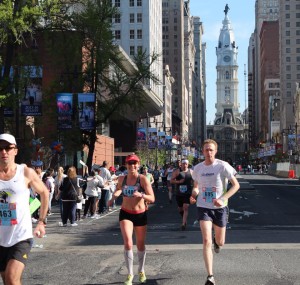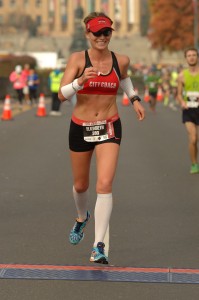
Broad Street Run 2015, around mile 6. Thanks, Alex, for capturing me when I was really feeling awful but trying to power through.
This past weekend, in what was meant to be my goal race for the Spring season, I not only missed my target finish by 4 minutes, but most of the race was a struggle. It wasn’t that I was ill-prepared – because I wasn’t. But getting sick with a head/chest cold meant my goals were simply no longer in the cards. Oxygen is vital while running (obviously!), and especially necessary when racing. Naturally I was disappointed, and also not feeling well. Not the best of combinations. But I told myself that while I couldn’t control being sick on race day, I could control my attitude. I’m sure I am not the first runner to have a bad goal race – in fact I know I’m not – and thought this could be a misfortune that could turn into a coaching lesson. After all, I am trying to look on the bright side.
If a goal race isn’t going to go the way you had hoped, there are a few things you can do. Here are some common scenarios and tips:
- Accept the things you cannot change. Modify your plan, goals, and expectations. Being in denial isn’t helpful, and just delays your disappointment.
- Perhaps poor weather is in the forecast. Adjust your wardrobe for it. Hot sun will mean you’ll need to fuel more frequently than perhaps anticipated. Rain means you may want to wear waterproof gear, or few layers. Wind means you will possibly need to adjust your paces. Nobody wins in a race against headwinds. You will simply need to modify your pacing and finish time expectations. Don’t believe me? Ask the folks who tried to fight the wind in the 2014 NYC Marathon.
- A stressful week or weekend leading into your goal race can cause issues. The odds are you have put race pressure on yourself, and if you are experiencing “taper tantrum,” you may naturally be more on edge. Remember to relax. Look at the big picture, and don’t make mountains out of mole hills.
- Bad health and minor injury are unfortunately unavoidable. For example, I had no control over the chest/head cold that plagued me this week and hit me hardest over race weekend. If you have a minor injury, all you can do is attempt to keep it happy. If health appears to compromise your goals, you need to accept that and modify your expectations and strategy. If IT Band issues plague you on race weekend, be prepared to pause and stretch on race morning. Also be prepared to change your pace and gait if you are tight or in pain.
- If you are late to the starting line, don’t panic. You may miss your corral, or be in a rush to get into the porta potty line or bag check – but loosing your cool will only lead to a frazzled race. Instead, remember you can always drop back to a different corral. Not ideal, but if you settle into those first few miles, the odds are your race pace won’t be compromised at all in the big picture. Stay stressed and abandon all reason, and you are asking for the wheels to come off.
It can be really sad, frustrating, and upsetting to miss the mark on a goal race. But remember, as long as you are safe and smart on race day, your racing career is far from over. Instead, I urge you to go out there and enjoy the morning as much as possible – even if that means running through a heat wave, or blowing snot and coughing up gunk in your lungs at an epic rate. Every race is a journey, and we cross that finish line slightly different from when we crossed the starting line. Enjoy the journey between those two points. You’ll have your day to capture that goal – it simply just may not be today.





